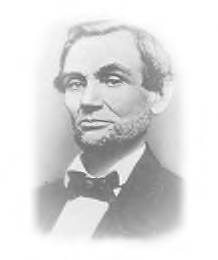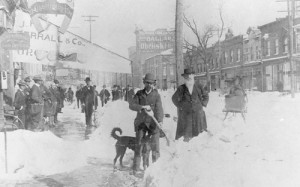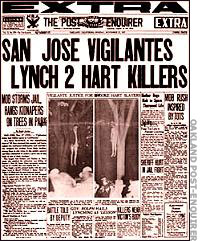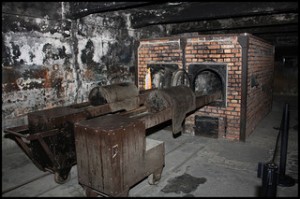November 26th History Lesson
1789 – A national Thanksgiving Day was observed in the United States as recommended by President George Washington and approved by Congress.

1842 – Right Rev. Celestine Guynemer de la Hailandiere offered land in Indiana to Father Edward Sorin of the Congregation of Holy Cross, on the condition that he build a college. On this date, Sorin traveled to the site with eight Holy Cross brothers and began the school using Father Stephen Badin’s old log chapel. They immediately acquired two students and set about building additions to the campus.
The school would become known as the University of Notre Dame.

1860 – A newspaper print of newly elected President Abraham Lincoln showed the beginnings of a beard. The idea for the beard had come from a letter sent by 11-year-old Grace Bedell, who had suggested that Mr. Lincoln would look better with a beard.

1862 – Oxford mathematician Charles Lutwidge Dodgson sent a handwritten manuscript called Alice’s Adventures Under Ground to 10-year-old Alice Liddell.
Dodgson, better known by his nom de plume Lewis Carroll, made up the story one day on a picnic with young Alice and her two sisters, the children of one of Dodgson’s colleagues. Dodgson, the son of a country parson, had been brilliant at both mathematics and wordplay since childhood, when he enjoyed making up games. However, he suffered from a severe stammer, except when he spoke with children. He had many young friends who enjoyed his fantastic stories: The Liddell children thought his tale of a girl who falls down a rabbit hole was one of his best efforts, and Alice insisted he write it down.
During a visit to the Liddells, English novelist Henry Kingsley happened to notice the manuscript. After reading it, he suggested to Mrs. Liddell that it be published. Dodgson published the book at his own expense, under the name Lewis Carroll, in 1865.

1898 – A powerful early winter storm battered the New England coast, killing at least 450 people in New York, Connecticut and Massachusetts. Blizzard conditions disrupted the entire area. Transportation became impossible; some trains were halted by 20-foot snow drifts. Communication was interrupted as the wind and snow brought down telephone and telegraph lines. In some towns and villages, residents were forced to dig tunnels through the snow from their front doors to the streets.
Boston was perhaps worst hit by the storm. Approximately 100 ships were blown ashore from the city’s harbor and another 40 were sunk. About 100 people died when a Portland-based steamer sank near Cape Cod. Bodies and debris filled the harbors and nearby beaches.
1917 – The National Hockey League was organized. It started with four teams (Montreal Canadiens, Montreal Wanderers, Ottawa Senators and Toronto Arenas) and, through a series of expansions, contractions, and relocations, is now composed of thirty active franchises. The “nation” referred to by the league’s name was Canada, although the league expanded into the U.S. in 1924 with the founding of the Boston Bruins.
1922 – Howard Carter and Lord Carnarvon became the first people to enter the tomb of Pharaoh Tutankhamen in over 3000 years.

1933 – Thousands of people in San Jose, CA stormed the jail where Thomas Thurmond and John Holmes were being held as suspects in the kidnapping and murder of Brooke Hart, the 22-year-old son of a local storeowner. The mob of angry citizens proceeded to lynch the accused men and then pose them for pictures.
After the incident, pieces of the lynching ropes were sold to the public. Though the San Jose News declined to publish pictures of the lynching, it condoned the act in an editorial. Seventeen-year-old Anthony Cataldi bragged that he had been the leader of the mob but he was not held accountable for his participation. At Stanford University, a professor asked his students to stand and applaud the lynching. Perhaps most disturbing, Governor Rolph publicly praised the mob. “The best lesson ever given the country,” said Governor Rolph. “I would like to parole all kidnappers in San Quentin to the fine, patriotic citizens of San Jose.”
1941 – Adm. Chuichi Nagumo directed the Japanese First Air Fleet, an aircraft carrier strike force, toward Pearl Harbor, with the understanding that should “negotiations with the United States reach a successful conclusion, the task force will immediately put about and return to the homeland.”
Negotiations had been ongoing for months. Japan wanted an end to U.S. economic sanctions. The Americans wanted Japan out of China and Southeast Asia – and to repudiate the Tripartite “Axis” Pact with Germany and Italy as conditions to be met before those sanctions could be lifted. Neither side was budging. President Roosevelt and Secretary of State Cordell Hull were anticipating a Japanese strike as retaliation – they just didn’t know where. The Philippines, Wake Island, Midway – all were possibilities.
American intelligence reports had sighted the Japanese fleet movement out from Formosa (Taiwan), apparently headed for Indochina. As a result of this “bad faith” action, President Roosevelt ordered that a conciliatory gesture of resuming monthly oil supplies for Japanese civilian needs canceled. Hull also rejected Tokyo’s “Plan B,” a temporary relaxation of the crisis, and of sanctions, but without any concessions on Japan’s part. Prime Minister Tojo considered this an ultimatum, and more or less gave up on diplomatic channels as the means of resolving the impasse.
1941 – President Franklin Roosevelt signed a bill officially establishing the fourth Thursday in November as Thanksgiving Day.

1942 – Casablanca, a World War II era drama starring Humphrey Bogart and Ingrid Bergman, premiered in New York City. It would go on to become one of the most beloved Hollywood movies in history.
1942 – President Franklin D. Roosevelt ordered nationwide gasoline rationing.

1944 – Reichsführer-SS Heinrich Himmler ordered the destruction of the Auschwitz-Birkenau gas chambers and crematoria. The technical installations of the gas chambers and the ovens of Crematorium II and III were to be dismantled for transportation to Gross Rosen concentration camp. Special squads of men and women prisoners were created to clean out, fill in and overlay with turf the pits where corpses had been burnt or where the ashes from the crematoria had been buried. The warehouses containing the personal effects of Jews who had perished were hastily emptied and their contents dispatched by train to the Reich.
1948 – The first Polaroid Land Camera Model 95 sold for $89.75 in Boston at the Jordan Marsh department store. The camera produced prints in about one minute.

1956 – The Price Is Right debuted on NBC and aired as both a daytime series and as part of the network’s primetime lineup. The daytime series aired daily while the evening series was aired once a week. Bill Cullen was the host.
1968 – O.J. Simpson won the 34th Heisman Trophy in the biggest landslide in Heisman history.
1975 – Lynette “Squeaky” Fromme, a Manson family devotee, was found guilty by a federal jury of trying to assassinate U.S. President Gerald Ford. Fromme, 27, had attempted to shoot the president in Sacramento CA Sept. 5 with a hand gun.
1986 – In response to the Iran Contra scandal, President Ronald Reagan announced the formation of the Tower Commission, to be headed by former Sen. John Tower of Texas. The Commission would take testimony from 86 witnesses, and concluded that CIA Director William Casey, who supported the Iran-Contra arrangement, should have taken over the operation and made the President aware of the risks and notified Congress as legally required.
1992 – Britain announced that Queen Elizabeth II had volunteered to start paying taxes on her personal income, and would take her children off the public payroll.

2000 – Florida Secretary of State Katherine Harris certified Republican George W. Bush the winner over Democrat Al Gore in the state’s presidential balloting by 537 votes.
2010 – Nineteen-year-old Somali-born Mohamed Osman Mohamud was arrested by federal agents during a sting in Portland, OR, accused of planning to detonate a van of explosives during a Christmas tree lighting ceremony.
Compiled by Ray Lemire ©2014 RayLemire.com. All Rights Reserved.
You may not, under any circumstances, reproduce, record, publish, republish, post, transmit, publicly display, publicly exhibit or distribute any articles or photographs on RayLemire.com without obtaining the express written consent of the Operator.
